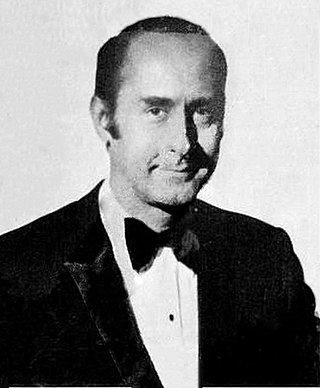
Henry Mancini was an American composer, conductor, arranger, pianist and flautist. Often cited as one of the greatest composers in the history of film, he won four Academy Awards, a Golden Globe, and twenty Grammy Awards, plus a posthumous Grammy Lifetime Achievement Award in 1995.
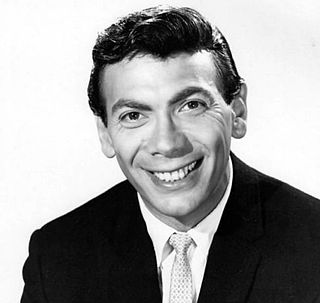
Edmund Dantes Urick, known professionally as Ed Ames or Eddie Ames, was an American pop singer and actor. He was known for playing Mingo in the television series Daniel Boone, and for his Easy Listening number #1 hits of the mid-to-late 1960s including "My Cup Runneth Over", "Time, Time", and "When the Snow Is on the Roses". He was also part of the popular 1950s singing group with his siblings, the Ames Brothers.

John Allan Jones is an American singer and actor.
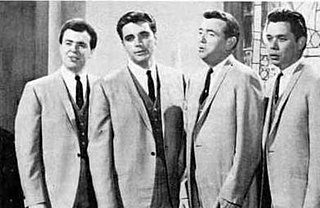
Jake Hess was an American Grammy Award-winning southern gospel singer.
Conrad Joseph Gozzo was an American trumpet player. He was a member of the NBC Hollywood staff orchestra at the time of his death.
Lou Monte was an Italian American singer best known for a number of best-selling, Italian-themed novelty records which he recorded for both RCA Victor and Reprise Records in the late 1950s and early 1960s, most famously "Lazy Mary" (1958) and the 1962/63 million-selling US single "Pepino the Italian Mouse", plus the seasonal track "Dominick the Donkey". He also recorded on Roulette Records, Jubilee Records, Regalia Records, Musicor Records, Laurie Records, and AFE Records.
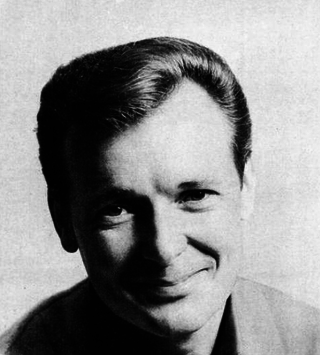
John Gary was an American singer, recording artist, television host, and performer on the musical stage.

The Davis Sisters of Philadelphia, PA were an American gospel group founded by Ruth Davis and featuring her sisters Thelma, Audrey, Alfreda and Edna. Imogene Greene joined the group in 1950, and was later replaced by Jackie Verdell when Greene left to join the Caravans.

Frankie Carle was an American pianist and bandleader. As a very popular bandleader in the 1940s and 1950s, Carle was nicknamed "The Wizard of the Keyboard". "Sunrise Serenade" was Carle's best-known composition, rising to No. 1 in the US in 1938 and selling more than one million copies.

George Beverly Shea was a Canadian-born American gospel singer and hymn composer. Shea was often described as "America's beloved gospel singer" and was considered "the first international singing 'star' of the gospel world," as a consequence of his solos at Billy Graham Crusades and his exposure on radio, records and television. Because of the large attendance at Graham's Crusades, it is estimated that Shea sang live before more people than anyone else in history.
"In the Garden" (sometimes rendered by its first line "I Come to the Garden Alone" is a gospel song written by American songwriter C. Austin Miles, a former pharmacist who served as editor and manager at Hall-Mack publishers for 37 years. According to Miles' great-granddaughter, the song was written "in a cold, dreary and leaky basement in Pitman, New Jersey that didn't even have a window in it let alone a view of a garden." The song was first published in 1912 and popularized during the Billy Sunday evangelistic campaigns of the early twentieth century by two members of his staff, Homer Rodeheaver and Virginia Asher.
"Take My Hand, Precious Lord" is a gospel song. The lyrics were written by Thomas A. Dorsey, who also adapted the melody.

His Hand in Mine is the fifth studio album by American singer and musician Elvis Presley, released on November 23, 1960 by RCA Victor in mono and stereo, catalog number LPM/LSP 2328. It was the first of three gospel albums that Presley would issue during his lifetime. Recording sessions took place on October 30 and 31, 1960, at RCA Studio B in Nashville, Tennessee. It peaked at #13 on the Top Pop Albums chart. It was certified Gold on April 9, 1969 and Platinum on March 27, 1992 by the Recording Industry Association of America.
Rouvaun (1932–1975) was born Jim Haun in Bingham, Utah. A child singer with the Mormon Tabernacle Choir in Salt Lake City, he went on to study voice at the Los Angeles Conservatory of Music and perform with the Beverly Hills Opera Company. Nonetheless, he remained a struggling woodworker studying voice. Rouvaun was a virtual unknown until February 5, 1967, when he appeared in Las Vegas as the headline singer leading the 100-person Frederick Apcar French stage review Casino De Paris at the Dunes Hotel. His first record label, KALAMO, described him on his debut album cover as "The World's Greatest Singer".

Double Trouble is the fifteenth soundtrack album by American singer and musician Elvis Presley, released by RCA Victor in mono and stereo, LPM/LSP 3787, in June 1967. It is the soundtrack to the 1967 film of the same name starring Presley. Recording sessions took place at Radio Recorders and at Metro-Goldwyn-Mayer studios in Hollywood, California, on June 28, 29, and 30, 1966. It peaked at number 47 on the Billboard 200.

The Best of Connie Smith is a compilation album by American country singer Connie Smith. It was released in September 1967 via RCA Victor and featured 12 tracks. The disc was Smith's first compilation project released in her career and featured her most popular singles made commercially successful between 1964 and 1967. It also featured one new recording titled "I'll Come Runnin'". Penned by Smith herself and released as a single, the song became a top ten hit on the American country songs chart in 1967.
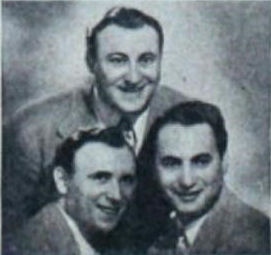
The Three Suns were an American pop group, most popular during the 1940s and 1950s.

Spinout is the 14th soundtrack album by American singer and musician Elvis Presley, released by RCA Victor in mono and stereo, LPM/LSP 3702, on October 31, 1966. It is the soundtrack to the 1966 film of the same name starring Presley. Recording sessions for the film songs took place at Radio Recorders in Hollywood, California, on February 16 and 17, 1966. The album was augmented with three non-film songs recorded earlier in the year. It peaked at number 18 on the Top Pop Albums chart.
This is a discography of South African musician Miriam Makeba (1953-2008).

Paul Mickelson was an American organist, arranger, and record label executive who specialized in Christian music. First performing for mass media at the age of 16, he gained national recognition as organist for the Billy Graham crusade from 1950 to 1958. He left Graham to concentrate on recordings, becoming an executive at Word Records before founding Supreme Records and its subsidiaries. He recorded and released numerous albums of religious music as an organist and orchestral arranger/conductor.













